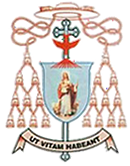- +234 9070497007
- info@archbishopvalokeke.org
GOOD SHEPHERD SUNDAY (Fourth Sunday of Easter)
INAUGURATION OF DIVINE MERCY DEVOTION IN ONITSHA ARCHDIOCESE
Introduction:
Today is traditionally known as the Good Shepherd Sunday. We pray for increase of vocations to the priesthood and religious life in the Church. We also pray that the virtues and spirit of Christ the Good Shepherd per excellence will be on shepherds namely, the priests and Bishops.
Also today, for us in the Archdiocese of Onitsha, we inaugurate more specifically, the devotion to Divine Mercy, which has been existing for a long time among us.
Thirdly, today we commit ourselves to the formation of the youth by supporting the Youth Village Projects.
Readings:
1st Reading: Acts 2: 14, 36-41
This is the concluding part of Peter’s sermon on the Pentecost day. Jesus whom they crucified is now Lord. He has been raised up and is now the Lord.
2nd Reading: 1Pet. 2: 20-25.
This was addressed to slaves. They were urged to bear wrongs patiently. To bear unjust suffering with patience just as Christ did for our sins though innocent. He bore his sufferings for love of us.
Gospel: John 10: 1-10
Jesus presents himself as the Good Shepherd. He is the gate. He provides life and safety.
The Shepherd: The shepherd is known for his patience, constancy, endurance and sacrifice. The shepherd does not think of himself nor is influenced by the neglect and prejudice around him. No danger no difficulty is too great to be faced and overcome. The shepherd is interested only in the sheep. He cares. The sheep are not the most responsive, they are not the most grateful. Yet the caring attitude of the shepherd is not dependent on such.
Q. As parents, teachers, doctor, nurses, civil servants, priests, Bishops, traders, heads of corporate bodies, what do we do?
We are guides to some extent. The prophets, the psychologist, the counselors, the priest…But the guide of guides is the Good Shepherd.
However, we have to bear in mind that families are the first church, the first seminaries and convents. Priests and sisters have also to go beyond administration of the sacraments. They have to look into the social problems of our time – poverty, peace, inadequate housing, etc. Parents and teachers spend more hours with the children. They must play a good role otherwise efforts would be wasted.
The Divine Mercy
The history of salvation is like the history and testimony of God’s merciful love.
1. From the call of Moses, the liberation of the Israelites, even the promise of salvation after the fall of man, to the incarnation and adoption of man in Christ all testify to God’s merciful love.
2. The miracles of Christ, the healings of the deaf, the blind, the lame, raising the dead, all are manifestations of mercy.
3. The parables – the prodigal son, the good Samaritan, the lost sheep, the lost coin, etc., all show divine mercy.
4. The popes, the fathers of the Church, the documents of the Vatican Council, etc., testify to this.
5. Pope John Paul II, gave us this feast on the 2nd Sunday of Easter, and canonized Sr. Maria Faustina.
6. Pope Benedict XVI emphasized that mercy is at the heart of the mystery of our redemption.
Let us develop, therefore, this devotion and profit by its immeasurable benefits – Jesus I trust in You.
The Youth and Divine Mercy
We need an abundance of divine mercy on our youths so that tomorrow will be promising. Let all our youths embrace this cherished devotion. We can show this mercy in practice by supporting the youth formation programmes.
May the Mercy of God come down on us. Amen.
Address List
- Onitsha Catholic Secretariat. Basilica Of The Most Holy Trinity. P.O.Box 411, Onitsha
- +2348021818008
-
contact@archbishopvalokeke.org
Social Networks
- Archbishopval
- @AbvalOkeke
- archbishopvalerianokeke
- Onitsha Archdiocese
